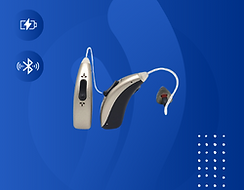Deciphering the Signs of Hearing Loss
- May 23, 2023
- 3 min read
Updated: May 30, 2023
Hearing loss is a prevalent condition that can significantly impact one's quality of life. The decision to seek hearing aids is an important step towards regaining the ability to communicate and engage fully in daily activities. However, recognizing when it's time to consider hearing aids can be a challenge. In this article, we will explore the key signs and indicators that suggest it may be time to seek assistance from hearing aids, drawing insights from multiple sources to provide a comprehensive guide.

Difficulty Understanding Conversations
One of the primary signs that indicate the need for hearing aids is struggling to understand conversations, particularly in noisy environments. If you find yourself frequently asking people to repeat themselves, missing important details during discussions, or experiencing difficulty following conversations in group settings, it may be a strong indication that your hearing has been compromised.
Increased Volume on Electronic Devices
If you consistently find yourself needing to raise the volume on your television, radio, or other electronic devices to levels that are uncomfortable for others, it may be an indication of hearing loss. Difficulty hearing sounds at a normal volume can be a sign that your hearing has diminished and requires assistance.
Social Withdrawal and Isolation
Hearing loss can have a significant impact on social interactions. Struggling to hear and actively participate in conversations can lead to frustration, embarrassment, and social withdrawal. If you find yourself avoiding social situations, missing out on group activities, or feeling isolated due to difficulties in communication, it may be a clear indication that hearing aids could greatly improve your quality of life.
Increased Fatigue and Mental Strain
Untreated hearing loss can place an additional cognitive load on the brain. Constantly straining to hear and understand conversations can lead to increased mental fatigue and exhaustion. If you find yourself feeling tired after social engagements or experiencing difficulty concentrating due to the energy expended in trying to hear, it may be a sign that hearing aids can help alleviate the cognitive strain.
Ringing or Buzzing Sounds (Tinnitus)
Tinnitus is a common condition characterized by the perception of ringing, buzzing, or other phantom sounds in the ears. While not always directly related to hearing loss, tinnitus often coexists with hearing impairment. If you experience persistent tinnitus alongside difficulty hearing, it is recommended to consult with a hearing healthcare professional to explore the potential benefits of hearing aids in managing both conditions.

Family and Friends Express Concern
Often, it is our loved ones who notice changes in our hearing before we do. If family members, friends, or colleagues express concerns about your hearing, it is essential to take their observations seriously. Their feedback can provide valuable insights and encourage you to seek professional help in determining if hearing aids are necessary.
Failed Hearing Screenings
If you have undergone a hearing screening or test that indicates hearing loss, it is crucial to consult with a hearing healthcare professional to discuss further evaluation and potential treatment options. Professional assessments can provide a more accurate diagnosis and determine if hearing aids are the right solution for your specific hearing needs.
In Summary, recognizing when it's time to consider hearing aids is crucial for improving communication, enhancing relationships, and maintaining an active lifestyle. If you experience difficulty understanding conversations, increased reliance on high volumes, social withdrawal, mental strain, persistent tinnitus, or concerns expressed by loved ones, it may be time to seek professional guidance. Hearing healthcare professionals can conduct thorough assessments and recommend appropriate hearing aids to help you regain the joy of hearing and improve your overall quality of life. Remember, early intervention can lead to better outcomes, so don't hesitate to seek assistance when you notice signs of hearing loss.
**The information presented in this article is intended for educational purposes only and should not be considered a substitute for professional medical advice. It is important to consult with a qualified healthcare professional for any concerns regarding your hearing health.





.png)
.png)
.png)
Comments